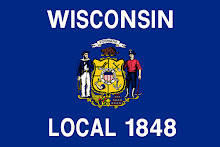"Taxes are what we pay for a civilized society,” Supreme Court Justice Oliver Wendell Holmes said ninety years ago.
Taxes are a part of our daily lives, through the money we
pay in sales tax or a deduction in our paycheck for income tax. Once a year,
property owners send in a check to their local government for property taxes on
their homes and farms.
Property tax is probably the most unpopular tax. A subset of
this tax, the personal property tax, came under fire at the recent Senate
committee hearing.
“When the tax bill came, I always viewed this tax as a
penalty.” Quentin Schultz of River Falls told our committee. He joined dozens
of business owners who traveled to Madison with hopes of getting rid of the
personal property tax.
About three percent of the property tax paid is for things
that are not land or buildings. Our committee heard from a diverse group of
businesses who asked for things such as the equipment to bake bread or their
ski lifts at a ski resort to not be taxed.
Over the years, business groups advocated for loopholes or
“exemptions” to the personal property tax. In a January 2017 paper, the
nonpartisan Legislative Fiscal Bureau (LFB) listed 18 pages of “exemptions” to
the personal property tax. The list includes many common items from A to Y:
from animals to youth hockey.
Business owners at the committee hearing gave many examples
of how difficult it was for them to know what was and was not taxed, and how
expensive the tax was for them to keep records. Many complained the tax on them
was unfair, calling it a “bad” tax.
But is there ever a “good” tax?
To answer this question, I turned to the teachings of many
economists I learned from over the years. Recognizing that all taxes have
negative effects, a “good” tax is broad-based - it affects everybody. It has a
low rate and does not have loopholes. When a tax is broad-based and has a low
rate, everyone pays something but no one pays too much.
A “good” tax is easy for taxpayers to comply with and easy
to collect. Finally, a “good” tax causes little change in normal economic activity.
The personal property tax fails this standard on many levels.
Lawmakers following the wisdom of “good” tax policy would
choose a reform that gets us closer to these standards. To be revenue neutral,
any lowering of the state’s revenue should be made up somewhere else.
The “somewhere else” or how the lost revenue would be made
up was never discussed in the committee hearing. The cost of this personal
property tax change would be about $520 million. For comparison, that is about
that same amount the Governor put in his budget as a “per student” increase for
all public schools.
Lawmakers who support eliminating the personal property tax
said they planned to add state money to offset the loss to local community.
They also said, without that additional state money, homeowners would pay
higher property taxes. Some communities would see a much higher increase in
property taxes. For example, the City of Blair in Trempealeau County receives
22% of its property tax revenue from personal property taxes.
The proponents of the bill suggested the money lost to
communities like Blair would be made up in more state aid. However, no one
could answer my question of where this money would come from.
I applaud my colleagues who want to get rid of a “bad” tax.
However, we must have an honest discussion about how we are going to pay for
local services upon which people depend.
History shows us that local government bears a heavy burden
to make up for cuts in state funding. Eliminating the personal property tax
increases that burden. If promises to make up for the loss of revenue are not
met, it will affect local programs and local taxes.
If we are going to eliminate “bad” taxes, we must consider
the consequences and discuss either who pays more or what goods and services we
want to do without.














No comments:
Post a Comment